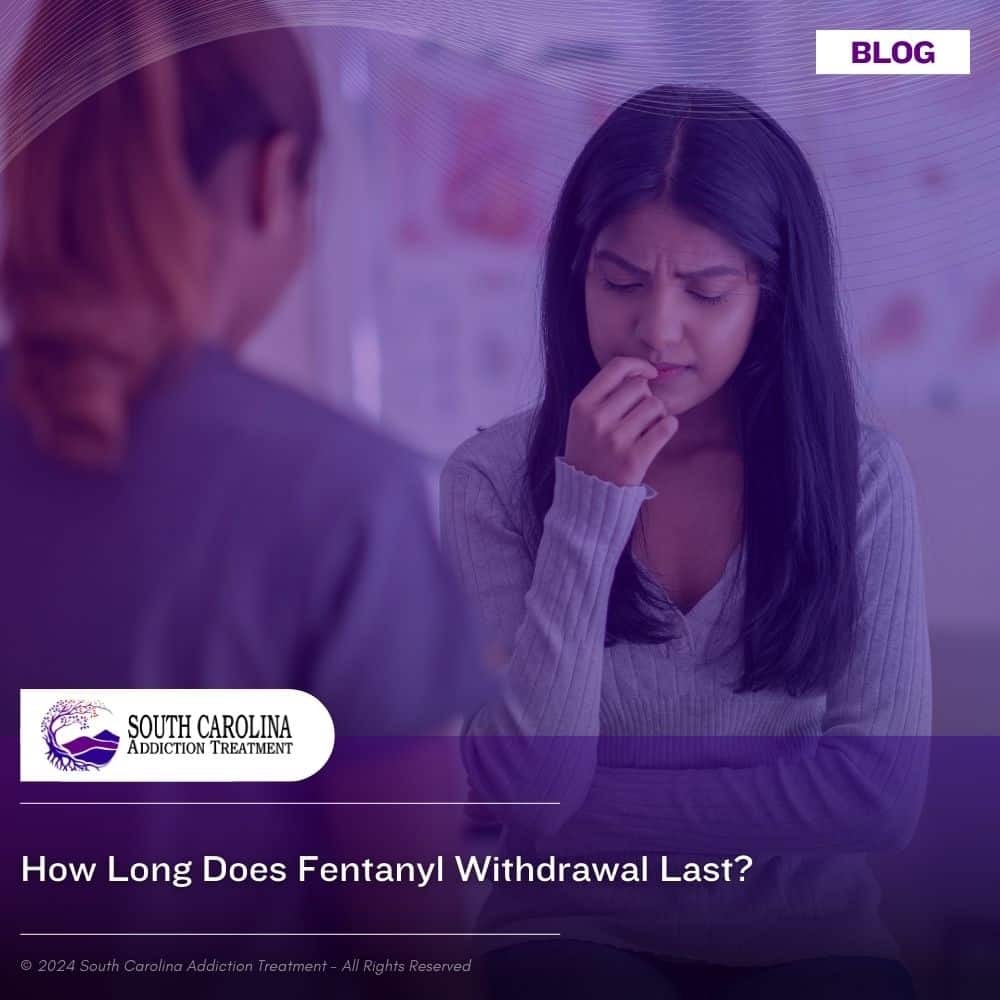How Long Does Fentanyl Withdrawal Last?

Medically Verified: 2/1/24
Medical Reviewer
Chief Editor

All of the information on this page has been reviewed and verified by a certified addiction professional.
Opioid use disorder is a serious problem in the United States, causing thousands of people to experience life-threatening overdoses. According to the National Institute on Drug Abuse (NIDA), opioids were responsible for 80,411 overdose deaths in 2021.
One of the most dangerous opioids of abuse is referred to as fentanyl. While this substance is available by prescription, the street version of the drug is responsible for most of the addiction and overdose rates. Illegally manufactured fentanyl (IMF) has made its way into all different types of drugs, as it is used as an adulterant by drug manufacturers.
Some people accidentally ingest fentanyl, while others begin abusing it when other opioids become less effective. Either way, fentanyl addiction is a life-threatening condition that requires professional treatment.
The first step in recovery is detoxing from fentanyl. If you are considering attending a fentanyl detox center, you might be wondering how long withdrawal lasts. Typically, fentanyl withdrawal begins within 12 hours of the last dose and can linger for up to 2 weeks.
What are the Symptoms of Fentanyl Withdrawal?
The symptoms and intensity of fentanyl withdrawal vary from person to person. For example, a person who takes high doses of fentanyl will have worse symptoms than someone who abuses low doses. That said, most individuals experience flu-like symptoms and mental health effects like depression or anxiety.
The common symptoms of fentanyl withdrawal include:
- Flu-like symptoms like headaches, runny nose, teary eyes, and fever
- Insomnia and restlessness
- Muscle aches or body cramps
- Gastrointestinal issues
- Joint and bone pain
- Feelings of weakness
- Fatigue
- Nausea, vomiting, and diarrhea
- Fast heartbeat and changes in blood pressure
- Respiratory issues
- Feelings of anxiety or depression
Since fentanyl withdrawal can be difficult to cope with, you should always attend medical detox. These programs reduce the risk of relapsing by using medications to limit your symptoms while keeping you medically safe throughout the process.
What is the Fentanyl Withdrawal Timeline?
How long fentanyl withdrawal lasts can vary depending on your history of substance abuse and whether you were using it long-term. Most people follow a similar timeline.
The general timeline for fentanyl withdrawal is as follows:
12 to 48 Hours
Between 12 to 48 hours after your last dose of fentanyl, you will begin to experience symptoms of withdrawal. The severity of your substance use disorder will impact how soon your symptoms arise. Usually, the initial symptoms of fentanyl withdrawal are mild, including insomnia, slight body aches, and cravings for opioids.
2 to 4 Days
Between the 2nd and 4th day of withdrawal, your symptoms will begin to peak. This means they will be at their most severe. During this time, you should be receiving care from a detox program to ensure your safety and prevent relapse.
Symptoms might include nausea, vomiting, diarrhea, mood swings, body aches, changes in heart rate or blood pressure, and intense cravings for fentanyl. Medical professionals will provide medication to limit these symptoms and prevent strong cravings.
5 to 14 Days
The symptoms of withdrawal will begin to slowly subside by the 5th day. You might continue to experience mild withdrawal symptoms for up to 2 weeks. It is most common to continue experiencing mental health symptoms like depression, anxiety, and insomnia.
While it is possible to develop a condition known as post-acute withdrawal syndrome (PAWS), a medical detox center can treat any lingering symptoms with medication, evidence-based behavioral therapy, and holistic treatments.
How is Fentanyl Withdrawal Treated?
While fentanyl withdrawal is not directly life-threatening, a relapse could be. People who relapse after a period of abstinence from fentanyl might attempt to take the dose they were accustomed to consuming. Because they no longer have a tolerance, this could be deadly.
Due to the risks of withdrawal, it is pertinent that you attend a medical detox program. These programs will offer FDA-approved medications to soothe withdrawal symptoms and prevent cravings.
Examples of medications used to treat fentanyl withdrawal include:
- Suboxone
- Methadone
- Clonidine
- Lucemyra
Detox programs will also closely monitor your physical and mental health throughout the withdrawal process. If any problems arise, you will be treated promptly to ensure safety and comfort.
Once you overcome withdrawal, you will be transferred into inpatient or outpatient treatment. These programs help you unpack the root causes of your addiction and teach you how to prevent relapse.
Finding Help for Fentanyl Withdrawal
If you or a loved one suffers from fentanyl addiction, it’s time to seek help. At South Carolina Addiction Treatment Center, we offer a continuum of care that sets our clients up for success. Whether you need medical detox or inpatient rehab, we are ready to support you in your recovery journey.
South Carolina Addiction Treatment is a state-licensed and CARF (Commission on Accreditation of Rehabilitation Facilities) accredited substance abuse treatment facility. We are a dual-diagnosis facility with a primary focus on substance abuse. We offer individualized, extended-term treatment in an intimate setting located in Greenville / Simpsonville, SC.
Contact us today to learn more about fentanyl detox and addiction treatment.

